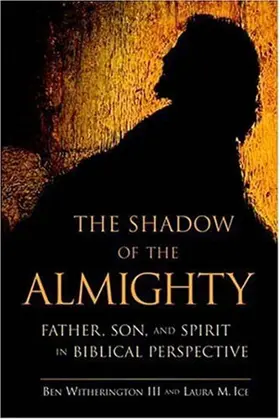

The Shadow of the Almighty: Father, Son and Spirit in Biblical Perspective
Pages
172
Publisher
Eerdmans
Published
1/8/2002
ISBN-13
9780802839480
"The Shadow of the Almighty introduces readers to the nature of God by exploring the biblical references to God as "Father," "Son," and "Holy Spirit." This fruitful approach offers fresh insight into the meaning of the biblical language used for God, giving readers the background necessary for properly understanding the trinitarian perspective of the New Testament and of the Christian faith." "Divided into four chapters, the book looks at "Father" language in early Judaism, at "Father" language in early Christianity, at "Son" language, and at language designating the Spirit. This thorough review of the traditional God language across the biblical texts shows what the earliest Christians understood by using these terms and, ultimately, what these terms mean for modern faith and practice." "While much of this material is deceptively familiar, the authors' close examination of how and where the different terms are used reveals some surprising results. It makes clear, for example, that speaking of God in trinitarian terms was not as radical a departure from early Jewish monotheism as many have thought, and it shows that while early Christianity was characterized by disparate ideas, the first Christians nevertheless shared a common understanding of God. Equally engaging findings of the book include the authors' support for the traditional gendered term "Father" when speaking about God." Complete with helpful questions at the end of each chapter, The Shadow of the Almighty provides an excellent place to begin a deeper study of God.
Reviews
Witherington and Ice have co-written a nice book that explores the concept of the Trinity from both a popular and scholarly level. The Shadow of the Almighty explores the complicated doctrine of the Trinity in a simple yet straightforward manner. Any student, scholar, or church member seeking to explain the nature of God as Father, Son, and Spirit can use this book. Witherington and Ice go into depth on textual discussions while keeping an eye on the theological issues at hand. The book is divided into four sections. Chapter 1 discusses the issue of the nature of God from both the Hebrew text and the ancient Near Eastern context of Judaism. Yahweh is discussed in light of the ancient gods and references to father and king. The Shadow of the Almighty also discusses the problem of father terminology between the Hebrew and Greek Testaments. It seems that Witherington and Ice explain the small references to Yahweh in the Hebrew Scriptures as an indication that the people of Israel were not ready to see Yahweh as Father. They also suggest that the Hebrew texts viewed God from the relationship of the people to their God. The nation needed to develop their relationship with God before they could call him Father.
[Full Review]
This is an interesting book that constantly puzzles the reader with the question of both its authorship and readership. One of the co-authors is a well-known New Testament scholar, as evidenced by his publication record of some twenty books, and the other holds an M.A. degree from Asbury Theological Seminary, where the other author teaches. The authors never explain the nature of their co-authorship such as who is responsible for what. Because the book is filled with unbalanced styles, tones, and depth and breadth of material, the reader cannot help but wonder whether the unbalanced features reflect different authorship or derive from something else. Similarly, the odd juxtaposition of uneven contents and styles makes the reader ask the question regarding the readership the authors intend. The book seems to assume a readership of biblical scholars and graduate students, such as when it refers to early Jewish literature without any introductory remark or explanation of the abbreviations it uses or when it occasionally offers a lengthy exegetical treatment using biblical languages. At the same time, however, the contents of the questions attached at the end of each chapter seem to address a faith community whose ultimate aim at reading the Bible is to get the biblical warrant for the doctrines of their faith. The authors do not even hesitate to use a creedal tone such as �In Jesus the promises of God are yes and amen� (62).
[Full Review]
